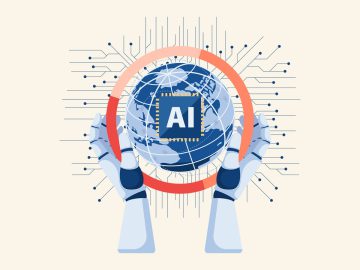As the excitement around Artificial Intelligence (AI) starts to level off, businesses are shifting their focus from the hype of AI to the practical realities of integrating AI and Generative AI (GenAI) into their ecommerce operations. These technologies have moved from the fringes of the enterprise to the core of operations, making AI in ecommerce essential for companies to thrive in an incredibly competitive market.
A new report from Harvard Business Review Analytic Services, sponsored by Coveo and SAP, takes a closer look at the real challenges companies face with AI and GenAI adoption, the tangible benefits they bring to ecommerce, and how they are reshaping customer experiences.
Let’s unpack the key insights from the report.
AI and GenAI are essential drivers of e-commerce success
If you take away only one thing from this report, let it be this: AI and GenAI are no longer optional for businesses looking to succeed in ecommerce.
With 70% of respondents identifying AI as critical to their operations and 65% viewing GenAI as essential for their future strategies, it’s clear that these technologies are no longer simply buzzwords — they’ve become foundational and a strategic necessity.
Companies that fully embrace these technologies stand to unlock greater customer satisfaction, higher revenue, and more efficient processes, making AI and GenAI the pillars of future ecommerce success.
GenAI’s untapped potential
One of the more surprising findings in the Harvard Business Review Analytic Services report is how many businesses are still using GenAI for limited purposes, focusing heavily on content creation. While 31% of companies are leveraging GenAI to generate marketing content, such as product descriptions, emails, and promotional materials, this only scratches the surface of what the technology can do.
GenAI has far more to offer beyond basic content generation. It can revolutionize the customer experience by delivering highly personalized interactions, which is imperative – 90% of respondents say personalized customer experiences are crucial for the future success of e-commerce. AI-driven chatbots, for example, can deliver personalized, conversational customer support, while predictive analytics can help anticipate customer needs before they explicitly state them.
By focusing narrowly on content creation, companies are missing out on GenAI’s potential to elevate the entire customer journey.
Businesses that broaden their application of GenAI to more dynamic, customer-facing roles, such as improving on-site search or offering personalized shopping journeys, can build deeper connections with customers and drive more meaningful engagement.
The people have spoken: Customer engagement is key — efficiency is secondary
Operational efficiency is often the first benefit businesses associate with AI and GenAI, and for good reason — 69% of respondents using GenAI report improvements in speed and efficiency. However, far fewer businesses are using these technologies to improve customer engagement, even though 90% of respondents say personalized experiences are essential for future success.
Only 46% of respondents are leveraging GenAI to enhance customer interactions, and just 32% are using it for personalization — two critical areas for building lasting relationships. This imbalance highlights a common misconception about AI’s true value in ecommerce. While automating back-office processes is important, the real power of GenAI lies in its ability to deliver highly personalized experiences, such as guided shopping, conversational commerce, and smart search and recommendations that mimic the in-store experience. By making customers feel understood and valued, GenAI drives deeper engagement and brand loyalty.
Customer engagement is the key to long-term growth. Shoppers are more likely to stay loyal to a brand that understands them, anticipates their needs, and provides a seamless, personalized experience. GenAI offers the tools to achieve this, but businesses must prioritize customer engagement over simple operational efficiencies to fully realize its potential.
The AI gap: Challenges are real around AI in e-commerce – but so are the competitive advantages
Despite the growing awareness of AI’s potential in ecommerce, only 40% of respondents have active AI use cases in their operations. This statistic reveals a significant gap between AI’s perceived importance and its actual adoption. Many companies are still in the exploration phase or face hurdles when trying to implement AI solutions, such as outdated infrastructure, data silos, or a lack of technical expertise.
This means that while AI is widely discussed as a transformative technology, we’re still in the early stages of seeing its full potential. For companies that are ahead of the curve, this presents a massive opportunity. Early adopters who successfully integrate AI into their ecommerce strategies are likely to gain a significant competitive advantage.
AI’s applications in personalized shopping, predictive analytics, and dynamic customer service have the potential to reshape the ecommerce landscape, but businesses must overcome their initial challenges to fully capitalize on these opportunities. Companies that wait too long to adopt AI risk falling behind, while those that act now can position themselves as leaders in a fast-evolving digital economy.
Smarter sales, service, e-commerce.
Get the ultimate CX AI toolkit HERE.
What’s really slowing down GenAI adoption?
Despite the excitement surrounding GenAI, several key obstacles are hindering its broader adoption in ecommerce. According to the report, 52% of respondents cite data privacy and security concerns as the primary barriers to implementing GenAI. This reluctance makes sense, as AI-driven personalization depends on collecting and analyzing vast amounts of sensitive customer data, which requires strict privacy measures to ensure compliance with regulations and maintain consumer trust.
Additionally, 38% of companies face a shortage of skilled talent, making it difficult to effectively deploy and manage these complex technologies. Without the right expertise, businesses may struggle to fully capitalize on the potential of GenAI. On top of that, 31% of respondents are grappling with technical integration challenges, such as outdated systems, data silos, and the complexities of merging new technology with existing infrastructures. These roadblocks underline the need for businesses to prioritize not only strong leadership and data governance but also invest in talent development and streamlined technological solutions to successfully implement GenAI and reap its full benefits.
Partnering with a company that has deep domain expertise can help overcome these obstacles and deliver a faster time to value. Leveraging the knowledge and experience of AI experts enables businesses to navigate the intricacies of deployment more effectively, ensuring smoother integration, quicker realization of benefits, and ultimately, a more successful implementation.





